Japan’s Ministry of Finance went to the trouble of creating a cute little mascot to sell government bonds. But there’s only one buyer that counts: The Bank of Japan. That’s not about to change—despite rising criticism of current stimulus policies.

In the land that gave us Hello Kitty, it’s no surprise the Japanese government employs an endearing mascot to sell its bonds. His name is Kokusai-sensei. A pint-size rendition of him welcomes visitors to the investor relations office at the Ministry of Finance. Pudgy and professorial, he’s got his own Twitter account and stars in an online manga.
Yet this whole publicity campaign seems rather unnecessary. There’s just not much for Kokusai-sensei to do these days, thanks to the existence of a single, massive buyer of Japanese government bonds: the Bank of Japan. Why bother to encourage private investors to buy JGBs when the BOJ has been devouring enough of them to finance the bulk of the government budget deficit since Prime Minister Shinzo Abe took office in December 2012?
Japan’s central bank has clamped a tight grip on the bond market in an effort to pull down borrowing costs and inject massive liquidity—all to propel the nation out of the deflation and stagnation that took hold in the 1990s. It’s worked, up to a point. In recent years, BOJ Governor Haruhiko Kuroda’s policy, backed by Abe, has helped boost growth and incomes in the world’s third-largest economy.
But the negative side effects of the Abe-Kuroda strategy are starting to pile up as investors and lenders increasingly struggle to cope with zero interest rates. Rock-bottom rates help sustain unproductive companies by shielding them from market forces. They also diminish the capacity of weak banks to absorb losses, especially regional institutions without nationwide networks.
Bu hikaye Bloomberg Markets dergisinin April - May 2019 sayısından alınmıştır.
Start your 7-day Magzter GOLD free trial to access thousands of curated premium stories, and 9,000+ magazines and newspapers.
Already a subscriber ? Giriş Yap
Bu hikaye Bloomberg Markets dergisinin April - May 2019 sayısından alınmıştır.
Start your 7-day Magzter GOLD free trial to access thousands of curated premium stories, and 9,000+ magazines and newspapers.
Already a subscriber? Giriş Yap
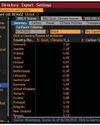
See Which Countries Are Falling Behind On Climate Change
Under the Paris Agreement, 190 countries and the European Union pledged to take steps to hold the global temperature rise to less than 2C (3.6F) from preindustrial levels—and preferably 1.5C.
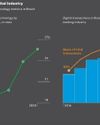
Billionaires Vie for the Future of Brazilian Finance
An escalating battle between two billionaires is upending the financial community in São Paulo, Latin America’s wealthiest city.

Ford Foundation's Darren Walker: ‘We Have to Get Uncomfortable'
DARREN WALKER, 62, disrupted his Wall Street life more than 25 years ago when he left what is now UBS Group AG to volunteer at a school and eventually pursue a career in community development and philanthropy. Since 2013 he’s been at the pinnacle of the philanthropic world as president of the Ford Foundation, created by the family of automaker Henry Ford during the Great Depression to advance human welfare.

Fueling the Ener Transition
I MAY BE BIASED, but some of the most important research and data on the Bloomberg terminal lies in one of its lesser-known functions: {BNEF }

Dig Into Analysts' Estimates for Disruptive Companies
THE PANDEMIC ERA generated a whole wave of disruptive companies as it accelerated the introduction of new products and services in areas including artificial intelligence, digitization, electronic payments, online meeting platforms, and virtual currencies.
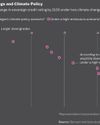
Climate Risks Come for Sovereign Credit
FOR YEARS climate scientists have warned about the ferocious wildfires and hurricanes that are now overwhelming many communities. Today alarms are ringing about a related financial danger: risks lurking within government bonds, the biggest part of the global debt market.

Responsible-Investing Pioneer Lydenberg Says ESG Needs An Upgrade
STEVE LYDENBERG’S passion for social change was inspired by anti-Vietnam War demonstrations, consumer boycotts, and the movement to divest from apartheid South Africa. But he didn’t take to the streets. Instead, Lydenberg turned to the world of finance to help catalyze societal change.

Engine No. 1's Grancio: ‘People Will Appreciate an Economic Argument'
ENGINE NO. 1 sent shock waves across corporate America in May when the fledgling investment firm won a boardroom battle with Exxon Mobil Corp., securing three seats on the oil and gas giant’s board after purchasing only about $40 million of its stock.
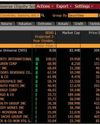
Find Out Which Companies May Ramp Up Payouts After Covid
AS THE PANDEMIC DISRUPTED business last year, many companies cut or suspended dividends. Which will boost their payouts when economies pick up again?
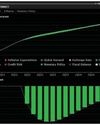
Get Into the Minds of Central Bankers as They Navigate Shocks
HAVE YOU EVER WONDERED how central bankers forecast the impact of shocks on the economy?